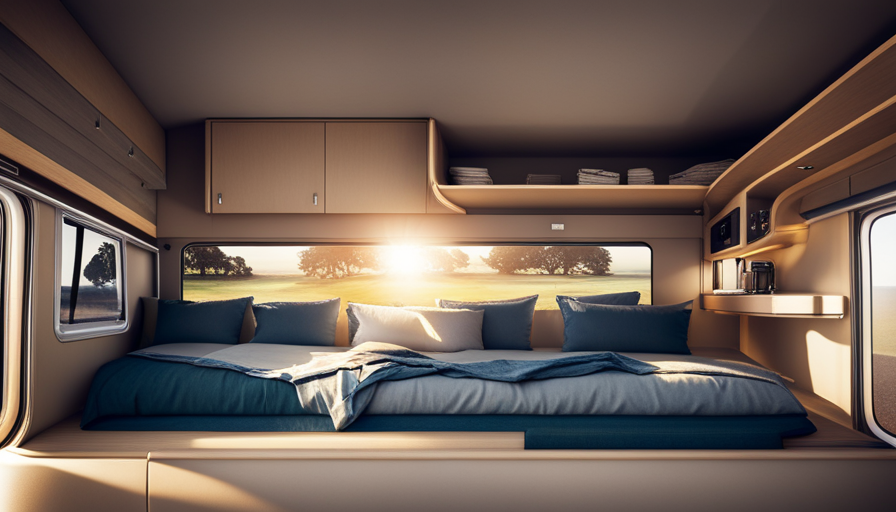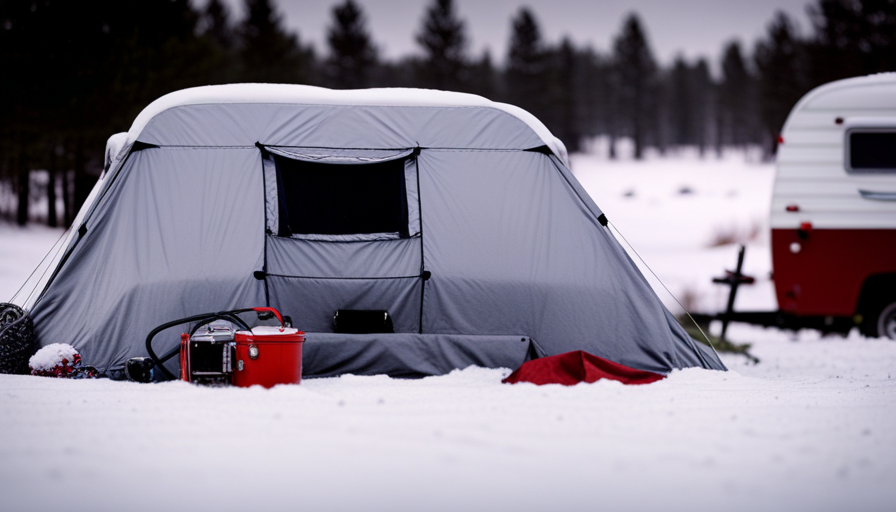Ever been curious about the additional weight a camper shell contributes to your truck?
It’s like carrying a little home on your back as you hit the open road. As an avid traveler and camper myself, I’ve always been curious about the weight of these shells.
In this article, we’ll dive into the world of camper shells and explore how much they actually weigh. We’ll uncover the different types of camper shells available, factors that affect their weight, and the average weight you can expect.
Additionally, we’ll discuss the benefits of lightweight camper shells and how weight distribution can impact your vehicle’s handling.
So, if you’re ready to hit the road with your camper shell, let’s find out just how much weight you’ll be carrying along on your next adventure.
Key Takeaways
- Camper shells come in different materials such as fiberglass, aluminum, and composite, each with its own advantages and features.
- Lightweight shells made from materials like fiberglass and aluminum offer enhanced fuel efficiency and are easier to handle and install.
- Proper weight distribution of the camper shell is crucial for vehicle handling, stability, and performance, and can prevent accidents and damage.
- When choosing a camper shell, consider factors like truck bed dimensions, interior space needed, and weigh the pros and cons of different materials to find the perfect fit for your camping adventures.
Understanding the Purpose of a Camper Shell
If you’re planning on using a camper shell for your truck, you’ll be amazed at how it transforms the bed into a cozy living space, perfect for camping adventures. Understanding the benefits of a camper shell is crucial in deciding whether it’s the right fit for you.
One of the main advantages is the added protection it offers to your belongings. Whether you’re transporting camping gear or tools for work, a camper shell keeps them safe from the elements and potential theft. Additionally, it provides a secure space for your pets during travel, ensuring their safety and comfort.
Different materials are used in camper shell construction, each with its own unique properties. Fiberglass is a popular choice due to its durability and lightweight nature. It offers excellent insulation, keeping the interior cool in the summer and warm in the winter. Aluminum shells are another option, known for their strength and resistance to corrosion. They are lighter than fiberglass shells, making them easier to install and remove.
Understanding the benefits and materials used in camper shell construction sets the stage for exploring the different types of camper shells available. From pop-up campers to truck bed toppers, each option offers its own set of features and advantages.
So, let’s dive into the world of camper shells and discover the perfect fit for your truck.
Different Types of Camper Shells
Among the various types of camper shells available, one can’t help but marvel at the sheer uniqueness each style possesses. Camper shells come in different materials, such as aluminum, fiberglass, and composite, each offering their own advantages and disadvantages.
When it comes to weight, it varies depending on the brand and material used. Here are five examples of different camper shell weights:
- Brand A: Made from lightweight aluminum, it weighs around 150 pounds.
- Brand B: Constructed with durable fiberglass, it weighs approximately 200 pounds.
- Brand C: Utilizing a composite material, it weighs about 180 pounds.
- Brand D: Crafted from heavy-duty aluminum, it has a weight of 250 pounds.
- Brand E: Engineered with a mix of fiberglass and carbon fiber, it weighs around 170 pounds.
These weights are approximate and can vary depending on the specific features and dimensions of each camper shell. Factors such as size, additional features, and reinforcement can also affect the overall weight of a camper shell.
Moving forward, let’s explore the various factors that can impact the weight of camper shells.
Factors Affecting Camper Shell Weight
To understand the factors influencing the weight of your camper shell, consider various elements such as materials, design features, and reinforcement methods. These factors play a significant role in determining how much your camper shell weighs.
Firstly, the materials used in the construction of the camper shell greatly impact its weight. Common materials include fiberglass, aluminum, and steel. Fiberglass shells tend to be lighter compared to aluminum or steel shells, which can add more weight.
Secondly, the design features of the camper shell can also affect its weight. Some shells have additional windows or storage compartments, which can add extra pounds. Conversely, a simpler and more streamlined design can help reduce the overall weight.
Lastly, the reinforcement methods used during manufacturing can contribute to the weight of the camper shell. Some shells are reinforced with additional layers of materials or structural supports, which can increase their weight.
Considering these factors, it’s important to note that the weight of a camper shell directly impacts the fuel efficiency of your vehicle. A heavier shell can increase drag and require more power to move, resulting in lower fuel efficiency.
In the next section, we’ll discuss the average weight of camper shells and provide more insights on this topic.
Average Weight of Camper Shells
When it comes to camper shells, you may be surprised to learn that the average weight can range from 200 to 500 pounds, depending on various factors. The weight of a camper shell is influenced by the materials used in its construction. Fiberglass camper shells tend to be lighter, while aluminum shells are often heavier. Other factors that can affect the weight include the size and design of the shell, as well as any additional features or accessories it may have.
To give you a better understanding, here are five factors that can influence the weight of a camper shell:
- Material: The type of material used, such as fiberglass or aluminum, can significantly impact the weight.
- Size: Larger camper shells generally weigh more due to the increased material required for construction.
- Design: Complex designs with curves and angles may add weight to the shell.
- Features: Additional features like windows, doors, and storage compartments can contribute to the overall weight.
- Accessories: Accessories like roof racks or ladder systems can add extra weight to the camper shell.
Considering the weight limits for camper shell installations, it’s essential to choose a shell that matches the weight capacity of your vehicle.
Now, let’s explore the benefits of lightweight camper shells.
Benefits of Lightweight Camper Shells
One major advantage of opting for a lightweight camper shell is that you’ll experience enhanced fuel efficiency on your travels. Lightweight camper shells are made from materials such as fiberglass, aluminum, or composite materials, which are significantly lighter compared to traditional materials like steel. This reduction in weight leads to less strain on your vehicle’s engine, resulting in improved fuel economy. Additionally, lightweight camper shells are easier to handle and install, making them a practical choice for those who frequently switch shells or travel alone.
To further emphasize the benefits of lightweight camper shells, here is a table showcasing their advantages:
| Advantages of Lightweight Camper Shells |
|---|
| Improved fuel efficiency |
| Easy handling and installation |
| Better payload capacity |
| Reduced wear and tear on the vehicle |
Opting for a lightweight camper shell offers numerous advantages such as enhanced fuel efficiency, easy handling, increased payload capacity, and reduced wear and tear on your vehicle. These benefits make lightweight camper shells a compelling choice for any camper enthusiast. When considering a camper shell based on weight, it is important to take into account other factors such as durability and compatibility with your vehicle.
Considerations When Choosing a Camper Shell Based on Weight
If you’re looking for a lightweight camper shell, it’s important to consider the weight implications without compromising on the overall performance and functionality. The weight of a camper shell is influenced by the materials used in its construction. Different materials, such as aluminum or fiberglass, can significantly impact the weight of the camper shell.
Aluminum shells tend to be lighter compared to fiberglass ones, making them a popular choice for those seeking a lightweight option. Choosing a lightweight camper shell can have several benefits, including improved fuel efficiency. A lighter shell puts less strain on your vehicle, which can result in better gas mileage. By reducing the overall weight of your setup, you can potentially save on fuel costs during your camping trips.
When considering the weight of a camper shell, it’s essential to keep in mind the impact it will have on your vehicle’s performance. You want to ensure that the weight of the shell does not exceed your vehicle’s payload capacity. Additionally, consider how the weight distribution may affect the handling and stability of your vehicle while driving.
In the next section, we will explore how to calculate the weight of a camper shell and provide guidelines to help you make an informed decision.
How to Calculate the Weight of a Camper Shell
To calculate the weight of your camper shell, you can use a simple formula that takes into account the materials used and their corresponding weights. By doing this calculation, you can determine the load capacity of your vehicle and ensure that you are not exceeding its limits.
To begin, make a list of all the materials used in the construction of your camper shell. Common materials include fiberglass, aluminum, and steel. Once you have the list, find the weight per square foot for each material. This information can usually be found online or by contacting the manufacturer.
Next, measure the surface area of your camper shell. Multiply the weight per square foot of each material by its corresponding surface area. This will give you the weight of each material in your camper shell. Sum up the weights to find the total weight of the camper shell.
To illustrate this process, here is a table that shows an example calculation for a camper shell made of fiberglass, aluminum, and steel:
| Material | Weight per Square Foot |
|---|---|
| Fiberglass | 3 lbs |
| Aluminum | 4 lbs |
| Steel | 5 lbs |
By using this table and the formula mentioned above, you can calculate the weight of your camper shell accurately. Understanding the weight of your camper shell is crucial because it affects the load capacity of your vehicle and can impact its handling. Speaking of weight distribution and its impact on vehicle handling, let’s move on to the next section.
Weight Distribution and its Impact on Vehicle Handling
When calculating the weight distribution of your camper shell, it’s important to consider the impact it has on your vehicle’s handling. An uneven weight distribution can lead to decreased stability and increased risk of accidents. Did you know that according to a study by the National Highway Traffic Safety Administration, improper weight distribution is a contributing factor in 13% of all vehicle crashes?
To better understand the importance of weight distribution, here are four key points to consider:
-
Balance: A balanced weight distribution ensures that the weight of the camper shell is evenly spread across the vehicle. This helps maintain stability and prevents excessive strain on certain areas.
-
Steering and Braking: An uneven weight distribution can affect the steering and braking performance of your vehicle. It can cause the vehicle to pull to one side, making it harder to control and increasing the risk of accidents.
-
Tire Wear: Improper weight distribution can lead to uneven tire wear. Excessive weight on one side can cause the tire to wear out faster, compromising its grip and overall performance.
-
Suspension: Uneven weight distribution can put extra stress on the suspension system, leading to premature wear and potential damage.
Considering the impact weight distribution has on vehicle handling, it’s crucial to ensure proper installation and removal of camper shells. This will be discussed in the next section, providing tips for safe practices.
Tips for Safe Installation and Removal of Camper Shells
When it comes to camper shells, it’s not just about their weight, but also about how you install and remove them safely. So, here are some installation tips and removal precautions to keep in mind.
Firstly, when installing a camper shell, make sure to clean the truck bed thoroughly to ensure a proper fit. It’s also important to use the right tools and equipment, such as clamps or brackets, to secure the shell in place. Additionally, consider using weatherproof sealants to prevent leaks and ensure a tight seal.
When it comes to removing a camper shell, take your time and be cautious. Start by removing any accessories or attachments, such as bike racks or roof racks. Then, enlist the help of a friend or two to lift and remove the shell carefully. It’s crucial to lift with your legs, not your back, to avoid any injuries.
Remember, camper shells can be heavy, so always prioritize safety and take necessary precautions during installation and removal.
Finding the right camper shell for your truck is an important decision. So, let’s dive into the next section and explore the factors to consider when choosing the perfect camper shell for your needs.
Conclusion: Finding the Right Camper Shell for Your Truck
Finally, after considering all the factors and tips, you’ll be well-equipped to find the perfect camper shell for your truck and embark on your next adventure with confidence.
When it comes to finding the right size of camper shell, there are a few key considerations to keep in mind.
-
Truck Bed Dimensions: Measure the length, width, and height of your truck bed to ensure a proper fit. This will help you avoid any compatibility issues and ensure that the camper shell sits securely on your truck.
-
Interior Space: Consider how much interior space you need. Think about whether you want a camper shell that allows for standing room, or if a smaller size will suffice. This will depend on your specific needs and how you plan to use the camper shell.
-
Material Options: Camper shells are typically made from fiberglass, aluminum, or composite materials. Each material has its own set of pros and cons. Fiberglass shells are durable and offer better insulation, but they can be heavier. Aluminum shells are lighter and more affordable, but they may not provide the same level of insulation. Composite shells offer a balance between the two, providing durability and insulation without being too heavy.
Considering these factors and weighing the pros and cons of different materials will help you make an informed decision when finding the right camper shell for your truck.
With the perfect fit and material, you’ll be ready to hit the road and enjoy your camping adventures with ease.
Frequently Asked Questions
Can a camper shell be installed on any type of truck?
Yes, a camper shell can be installed on almost any type of truck with the right compatibility. The installation process involves securely attaching the shell to the truck bed, ensuring a proper fit and stability.
It’s important to consider the specific dimensions and design of the truck bed when selecting a camper shell for installation. By doing so, you can enjoy the benefits of added storage space and protection for your truck bed.
What are the different materials that camper shells are made of?
When considering camper shell materials, fiberglass is a popular choice. It offers several advantages such as being lightweight, durable, and resistant to rust and corrosion. However, fiberglass shells can be more expensive and require careful handling to prevent cracking or damage.
Other materials like aluminum and steel offer their own benefits, such as affordability and strength, but they may be heavier.
Ultimately, the choice of material depends on individual needs and preferences.
Are camper shells waterproof?
Camper shells can be made waterproof through various techniques. Many camper shells are manufactured with waterproof materials such as fiberglass, aluminum, or ABS plastic. They often feature weather-stripping and seals around openings to prevent water from entering. To ensure long-lasting waterproofing, regular maintenance is crucial. This includes checking seals for damage, cleaning them regularly, and applying sealant if needed. Following these maintenance tips will help keep your camper shell waterproof and protect your belongings from water damage.
Can a camper shell be used for storage purposes?
Yes, a camper shell can definitely be used for storage purposes. It provides a secure and organized space to store your belongings while you’re on the go. With its sturdy construction and lockable doors, a camper shell ensures the safety and protection of your items.
Whether you’re traveling or just need extra storage space, a camper shell is a practical solution for keeping your belongings secure and easily accessible.
How much weight can a camper shell typically support on its roof?
A camper shell can typically support a significant amount of weight on its roof, but the exact weight capacity may vary depending on the specific model and manufacturer. To ensure proper installation and weight distribution, it’s crucial to follow the manufacturer’s guidelines and instructions.
It’s recommended to consult the owner’s manual or contact the manufacturer directly to determine the maximum weight that a specific camper shell can support on its roof.
Conclusion
In conclusion, finding the right camper shell for your truck is crucial for a smooth and efficient camping experience. By understanding the purpose of a camper shell and considering factors such as weight, you can make an informed decision.
Lightweight camper shells offer numerous benefits, from improved fuel efficiency to easier installation and removal. Remember to calculate the weight of the camper shell and consider weight distribution for optimal vehicle handling.
So, don’t let the weight of the decision weigh you down, choose wisely and hit the open road with confidence!










